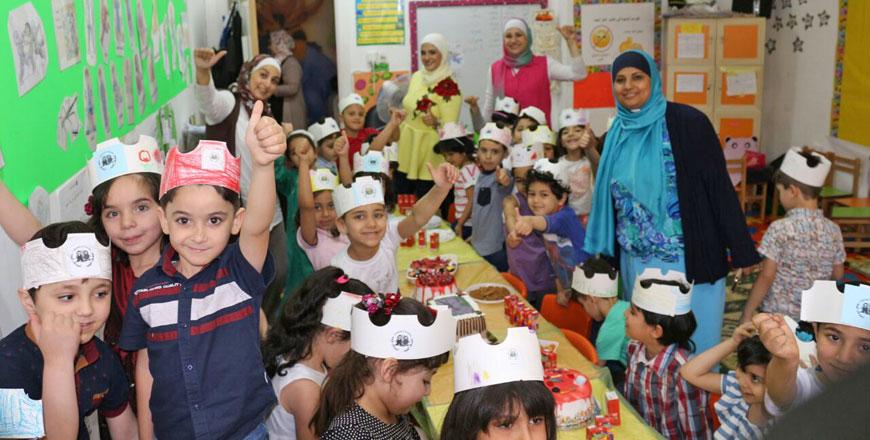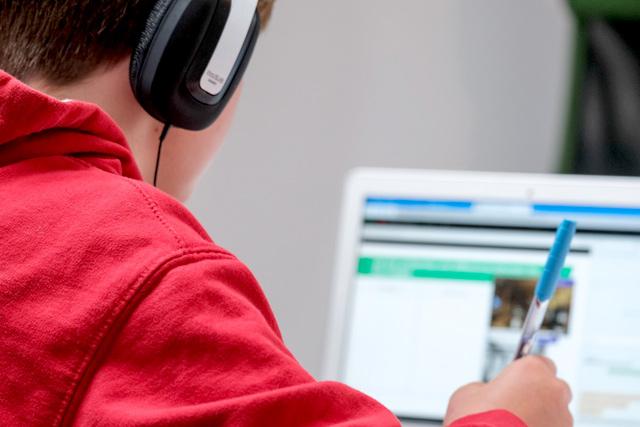You are here
Programme promotes children's mental health through storytelling
By Camille Dupire - Apr 21,2018 - Last updated at Apr 21,2018

Children take part in a Labeeb's Friends storytelling session in a kindergarden in Amman recently (Photo courtesy of Labeeb’s Friends)
AMMAN — A local organisation is helping young children improve their well-being through storytelling, aiming to develop mental health awareness from an early age.
Existing in 30 countries worldwide, Zippy's Friends programme was established in Jordanian schools and kindergartens in 2016 under the title “Labeeb's Friends”, in partnership with Umnyat, a local organisation run by Amani Attili.
“When kids go to school, they are usually taught theoretical knowledge or practical skills, but rarely psycho-social aspects of life,” Labeeb’s communication officer, Hiba Ibrahim, explained, stressing that “part of ‘being well’ as a child entails knowing how to communicate whether with your parents, your peers or yourself”.
Ibrahim, who is also Attili's daughter, said growing up with a mother who is an expert in the field of mental health and education provided her with evidence for the effectiveness of the vision behind Labeeb’s Friends. “Children often do not know how to deal with their emotions, how to recognise them even and it is crucial to help them learn how to identify and communicate them effectively to be able to cope with their anxieties and difficulties, and to develop skills that will help them in all aspects of life,” she told The Jordan Times.
The programme, which is run by Partnership for Children, an independent UK charity that promotes children’s mental health and emotional well-being around the world, is tailored to each country through partnerships with local entities such as Jordanian Umnyat.
“We are very careful about taking local specificities into account when designing the programme,” Ibrahim explained, noting that the Jordanian design even differs from the one in Kuwait or the upcoming one in Palestine.
Labeeb’s Friends runs for 24 weeks, with one 45-minute session each week. “Instead of abstracting it as an extra-curricular activity, we integrated Labeeb into the curriculum like any other module,” Ibrahim said, noting that the sessions are “highly engaging and interactive” and “not just passive storytelling”.
Each session begins with the teacher reading part of the story, followed by activities with the children such as drawing, role playing, games, etc, she explained. “We introduce mental health promotion concepts and skills through six modules which follow the stories of several characters going into struggles, emotional problems in a realistic school environment. This is a way to teach children how to learn about their emotions such as anger, jealousy, sadness, while teaching them how to deal with situations such as bullying, loss, change, among many other issues,” she said.
Although the programme focuses on kids' well-being, the work is also including every single member of the child's surroundings, including teachers, parents and peers.
“We sometimes give them activities to do at home to share what they learned with their family. We consider it our duty to raise teachers’ and parents’ awareness about concepts and skills of emotional and social learning, to ensure sustainable benefits for the kids,” Ibrahim underscored.
A coordinator at a school which is part of the programme recalled: “I attended a class where a student was shouting and crying while trying to express her feelings, where another student in the class said : ‘You mustn’t shout, you have to talk in a clear voice if you’re nervous, so we can understand and help you like we learned in Labeeb’.”
Meanwhile, several parents expressed their improved understanding of their children's needs, with a mother saying "I have learned that I need to create times of listening, dialogue and sharing within our family."
So far, the results have been overwhelmingly encouraging, according to Ibrahim, who cited the 2017 annual survey showing that 100 per cent of teachers said Labeeb helped them recognise and support most vulnerable children in the classroom, while 91 per cent said students developed empathy and compassion towards their peers.
For 86 per cent of the teachers involved in Labeeb’s Friends, "a concrete shift happened in terms of conflict resolution and problem solving among children".
Currently implemented in eight schools across the Kingdom, Labeeb's Friends is working on expanding its model to reach out to schools in refugee camps, host communities, and the public sector as a whole.
Meanwhile, Attili, who is also the regional coordinator for Partnership for Children, is working on expanding the programme to Palestine, Oman and Lebanon in the near future, her daughter explained.
Related Articles
Bullying can affect the physical and emotional health of your child, both in the short term and later in life.
AMMAN — Eighty-two per cent of students who participated in a survey by the Jordanian National Commission for Women (JNCW) said they receive
AMMAN — Going back to school amid the pandemic has provoked a mix of emotions from parents, teachers and students.A group of Jordanan mother


















